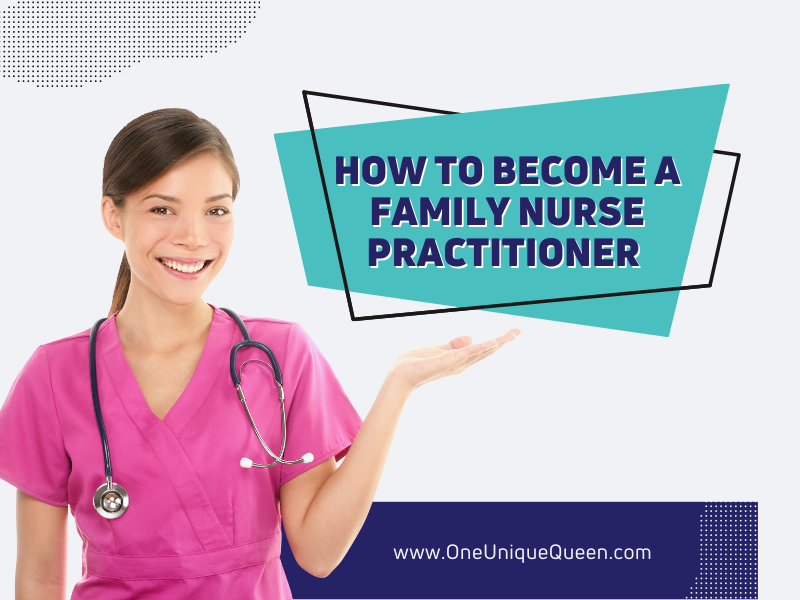


Are you a nurse who is looking to increase your earning potential and improve your job security?
Do you want to progress in your career and actively make a difference in your local community?
If yes, then a career as a Family Nurse Practitioner (FNP) is the ideal path for you.
To get started on your new professional journey and achieve your dreams of becoming an FNP, simply follow the below steps.
But first, let’s take a closer look at what a day in the life of a Family Nurse Practitioner looks like and what type of person is best suited to this demanding and rewarding career.
What is a Family Nurse Practitioner?
A family nurse practitioner, or FNP for short, specializes in the primary care of patients of all ages. Typically, an FNP focuses on preventative care and monitors the long-term health of their patients.
Family nurse practitioners tend to work alongside physicians, although in most states, they are permitted to practice alone.
Known for being an incredibly rewarding role within the healthcare sector, you will be able to help your local community and see the tangible results of all your hard work.
What type of person can be a Family Nurse Practitioner?
If you are already working as a registered nurse, then you most likely already have many of the attributes needed to be a successful FNP. These include:
- Compassion. You need to be able to show empathy and listen to the concerns and worries of your patients.
- Good communicator. You will be required to deal with people from all social classes, so you need to have excellent communication skills.
- Detail-orientated. You will be responsible for reviewing your patient’s medical history, as well as diagnosing, treating, and educating your patients, so good attention to detail is a must.
- Confidence. As a primary health care provider, you need to be confident in your abilities so that your patients feel safe under your care.
- Optimism. You need to be a positive person to work in any healthcare field as your demeanor can have a huge effect on your patients.
You also need to be willing to take responsibility for your actions and decisions and remain aware of your responsibilities to your patients and their families.
It can also be advantageous to have the ability to manage your stress levels as life as an FNP can be challenging.
How to Become a Family Nurse Practitioner
If you think that a career as a family nurse practitioner is the right choice for you, then now you need to take action to make it happen.
If you are not sure where to start, then simply follow the below steps:
Step 1: Become a registered nurse
If you are not already a registered nurse, then this is the first step that you need to take to become a family nurse practitioner.
To become an RN, you must complete a degree in registered nursing, such as a bachelor of science in nursing (BSN), and be certified as a registered nurse in a U.S. state or territory.
Students must also pass the RN license exam, known as the NCLEX-RN, which is regulated by the National Council of State Boards of Nursing. Once you have completed your nursing education and passed the licensing exam, you can then apply for an RN licensure through your state’s board of nursing.
It can also be beneficial to gain at least 2 years of experience as a registered nurse before you apply for online FNP certificate programs.
Step 2: Complete an accredited FNP program
Once you have an active RN license and hopefully get some experience as a registered nurse under your belt, you can now start studying to become a family nurse practitioner.
To qualify as a family nurse practitioner and be legally allowed to practice, you need to enroll in an FNP program that has been accredited by the Commission of Collegiate Nursing Education (CCNE) or the Accreditation Commission for Nursing (ACEN).
You can choose to study online, on-campus, or in a hybrid format, depending on your current circumstances and commitments.
There are several different types of family nurse practitioner programs that you can choose from, including:
- BSN to MSN programs
These are designed for students who have already earned a BSN from an accredited program and are comprised of master-level courses.
- Bachelor’s to MSN programs
If you are an RN with a bachelor’s degree in a non-nursing field, you can earn an MSN without earning a second baccalaureate degree. Again, this type of advanced degree program will predominantly be comprised of mater-level courses but may also contain a few under-graduate level courses.
- RN to MSN programs
RN to MSN programs are designed to help you save time and take fewer classes to earn two degrees: MSN and BSN. Although the requirements for each RN to MSN degree program will be different, as a general rule, you will need to have either a BSN degree or an Associate’s degree in nursing. Most programs will also ask for a minimum GPA of 3.0.
- Post-MSN programs
Post-MSN degree programs are available to students who already hold an MSN certificate and are aimed at nurses who are looking to specialize in a specific type of nursing, such as an FNP or a PNP.
- BSN to Doctorate
If you do not have an MSN, but you want to apply for a Doctor of Nursing program, then a BSN to DNP will enable you to complete both an MSN and DNP degree simultaneously.
What can you expect to study in an FNP program?
FNP
Although each FNP program will be different, you can expect to study courses including:
- Advanced health assessment
- Primary health care for the family
- Advanced physiology and pathophysiology
- Biostatistics and research for healthcare providers
- Advanced pharmacology
- Health care ethics
- Health systems and policy
- Crisis health care for families
- Advanced practice nursing
Online vs. on-campus FNP programs
As briefly mentioned above, you can choose to complete your chosen FNP program either online, on-campus, or a combination of the two.
If you are currently working as a registered nurse or another demanding role within the healthcare sector, then an online course is probably your best option as it offers more flexibility than an on-campus course.
Other benefits of choosing an online FNP program include:
- Affordability. You can continue to work, there are no commuting or housing costs, and you do not need to pay for childcare as you can study around your family commitments.
- Flexibility. You don’t have to turn up to set class times. Instead, you can study wherever you want and whenever. You can also choose between part and full-time courses depending on your existing schedule.
- Access to online resources. Instead of having to carry expensive and heavy books and course materials to lessons, you will be provided with all the course materials and resources you need online, usually at no extra cost.
- Global networking. Arguably one of the best aspects of online studying, you get to engage with students and tutors from all over the world.
- Self-discipline. Studying online requires self-motivation and self-discipline, both of which are highly attractive qualities in a family nurse practitioner. This is especially true if you plan to practice independently.
- More choice of courses. Typically, online courses offer more variety when it comes to course material, so you are more likely to find the right course for you and your professional goals.
- Better time management. Employers value skills such as time management and recognize that it is a challenge to juggle work, family life, and further education. As there are no set classroom times when studying online, you are required to be proactive in your approach to learning and scheduling.
Step 3: Gain certification through the ANCC or the AANPCB
Once you have completed your chosen accredited FNP program, you now need to obtain a certificate from either the American Nurses Credentialing Center (ANCC) or the American Academy of Nurse Practitioners Certification Board (AANPCB).
To obtain this certification, you will be required to take an exam and pass certain criteria set by each organization.
ANCC Exam
The exam from the ANCC to become a certified FNP includes two hundred questions that focus on both theory and clinical practice.
During this exam, you will be assessed on concepts such as physiology, pathogenesis, pharmacotherapies, and advanced health assessments across the lifespan.
The ANCC exam is in a multiple-choice format and takes place over 3.5 hours.
AANPCB Exam
The exam from the AANPCB to become a certified FNP includes 150 questions that assess your clinical knowledge in families and individuals across the lifespan of prenatal, pediatric, adolescent, adult, and elderly primary care. This exam is predominantly focused on your clinical knowledge, so is recommended for students who want to practice in a clinical setting rather than a research or education-based role.
The AANPCB exam is also multiple-choice and provides only one right answer to each question.
It is worth noting that both these certifying boards require recertification every 5 years.
Step 4: Apply for an FNP/APRN State License
After you have received confirmation from either the ANCC or the AANPCB, you now need to apply for your state license in advanced practice registered nursing.
To be eligible for this license, you need:
- To have completed an accredited graduate program in nursing.
- To have gained board certification through the ANCC or the AANPCB
- To have passed a background check
- To have completed a set number of clinical hours
To apply for your license, you need to submit all the relevant paperwork, including proof of your qualifications as well as a fee, to your state’s board of nursing.
Typically, the license requirements are the same from state to state. However, there are a few states that have their own specific requirements, including Florida, Texas, and California.
To ensure that you pass the necessary requirements set out by your state, it is a good idea to check with your state’s board of nursing before you enroll in an MSN program.
Step 5: Apply for your first FNP job
Congratulations! You are now a fully qualified family nurse practitioner that is legally permitted to practice in your state. The last step is to land your dream role.
If you are not sure where to start with finding a job as a family nurse practitioner, the below mini-guide should help you:
- Update your resume.
If you have just graduated, you will have lots of new clinical experience to add to your resume. You may also need to delete any previous experience that is not related to nursing.
- Create a LinkedIn profile.
If you don’t already have a LinkedIn profile or you have not spent much time updating yours recently, then now is the perfect time to carry out this important task. LinkedIn profiles are particularly useful for NPs and FNPs as they allow you to showcase your skills and experiences, make new connections and gain endorsements.
- Use recruiters.
Online recruiters such as Indeed.com, Zip Recruiter, Glassdoor, and CareerBuilder can all help you to find FNP jobs in your local area. All you need to do is upload your resume and start searching.
- Use other sources.
If you are not having much luck on the above job sites, there are other resources that you can turn to. These include the ENP Network, as well as the AANP and the ANCC. You can also ask your state’s nursing association for help in finding a position in your area.
Conclusion
While it may seem like you have to jump through a lot of hoops to become a qualified and licensed family nurse practitioner, once you get there, it will be worth all the hard work and effort.
As a Family Nurse Practitioner, you can enjoy a highly competitive salary, a good level of job security, a sense of fulfillment, and even the chance to open your own primary health care practice.
What more could you want from a career?
What do you think is the most rewarding part of being a Family Nurse Practitioner? Let me know in the comments below!









COMMENTS MAKE ME HAPPY!